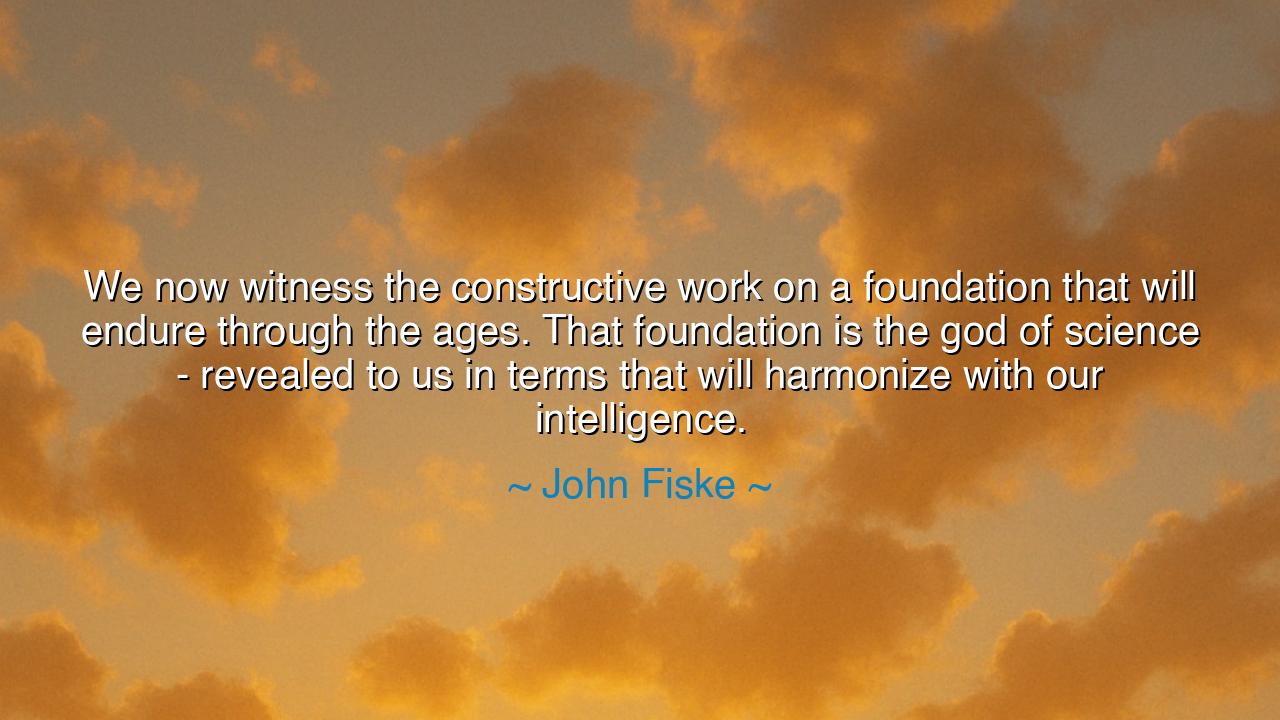
We now witness the constructive work on a foundation that will
We now witness the constructive work on a foundation that will endure through the ages. That foundation is the god of science - revealed to us in terms that will harmonize with our intelligence.






“We now witness the constructive work on a foundation that will endure through the ages. That foundation is the god of science — revealed to us in terms that will harmonize with our intelligence.” Thus spoke John Fiske, philosopher and historian of the 19th century, a man who stood upon the threshold between two worlds — the world of faith and the world of reason — and sought to unite them. His words, though steeped in the language of his time, carry a timeless resonance. They speak of a new revelation, not born of scripture or prophecy, but of understanding, of the human spirit awakening to the divine order written not in sacred texts but in the laws of nature themselves.
In this declaration, Fiske envisions a foundation that endures — not of marble or gold, but of knowledge and truth. He wrote during the age when the discoveries of Darwin, Newton, and Faraday were transforming human thought. The old certainties trembled before the power of observation and experiment. Many feared that science would destroy faith, but Fiske saw something different: he saw harmony, not conflict, between the spiritual and the intellectual. In his view, science was not an enemy of the divine — it was the divine expressed in new form. He called it “the god of science,” not to replace the Creator, but to show that truth revealed through reason is itself a kind of sacred revelation.
This harmony between faith and intelligence lies at the heart of his vision. Fiske believed that as humanity’s understanding grew, so too would its reverence for the mystery of existence. Where superstition had once reigned, knowledge would now bring humility; where blind dogma divided, reason would unite. To him, every scientific discovery — from the movement of the stars to the beating of the human heart — was a verse in the grand hymn of creation. Thus, when he speaks of a god “revealed to us in terms that harmonize with our intelligence,” he means that the divine is not separate from the laws of physics or the beauty of mathematics; it is woven through them, awaiting those who seek it with both intellect and wonder.
Consider the story of Galileo Galilei, that great seeker of truth who dared to lift his eyes to the heavens and saw what others feared to see. For revealing that the earth moved around the sun, he was condemned, silenced, and made to kneel before those who could not bear the thought of change. Yet time has vindicated him, and his telescope became a symbol of humanity’s ascent toward enlightenment. Galileo’s courage embodies the spirit of Fiske’s “constructive work” — the building of a foundation not upon ignorance or authority, but upon the eternal rock of evidence and reason. What Galileo began, others continued; and through their labor, the edifice of understanding rose ever higher, crowned by the light of discovery.
But Fiske’s wisdom extends beyond the halls of science; it speaks to the heart of civilization itself. For every age must choose what kind of foundation it will build upon — whether one of fear and division, or one of inquiry and cooperation. The god of science, in Fiske’s sense, is not a deity to be worshiped in temples, but an ideal to be lived — the ideal of seeking truth without arrogance, of using knowledge not to dominate, but to uplift. It calls us to build societies grounded in reason, compassion, and curiosity — for only such societies will “endure through the ages.” When ignorance is glorified and wisdom dismissed, the foundation cracks; but when the pursuit of understanding is honored, the structure of humanity stands firm.
And yet, Fiske’s vision carries a warning. The god of science, like all gods, demands reverence — not blind obedience, but ethical responsibility. Knowledge, if severed from conscience, becomes destructive. The same mind that discovers the atom can split it in rage; the same hand that heals through medicine can harm through greed. Therefore, Fiske’s call is not merely to admire the power of science, but to harmonize it with wisdom, to let intelligence be guided by moral vision. Science must not merely reveal how the world works — it must help humanity decide what to do with that understanding.
Therefore, O seeker of wisdom, take this lesson into your heart: build your foundation upon truth, and let that truth be guided by both reason and compassion. Do not fear the growth of knowledge, for every discovery brings you closer to the divine rhythm that governs the universe. Let your faith be not in superstition, but in the living wonder of understanding. Ask questions boldly, and listen humbly to the answers that nature provides. For the world is a vast and sacred text, written not in ink but in light and law, and those who read it with open eyes partake in the very act of creation.
Thus, as John Fiske foretold, we witness still “the constructive work” — the building of that great edifice of knowledge which, if guided by wisdom, will indeed endure through the ages. Let every generation add its stone to that foundation — of truth, of humility, of harmony between the heart and the mind — so that when our time has passed, those who come after may stand upon it and look upward, knowing that in understanding the universe, they have drawn closer to the eternal intelligence that created it.






AAdministratorAdministrator
Welcome, honored guests. Please leave a comment, we will respond soon